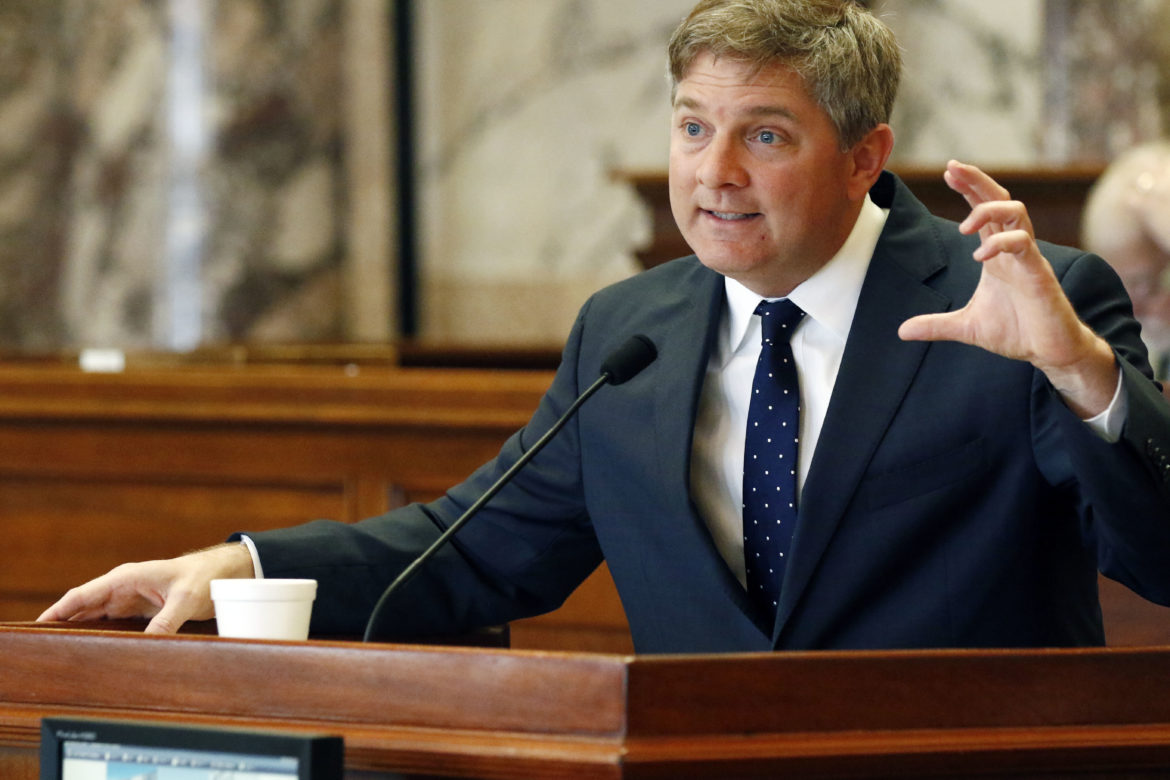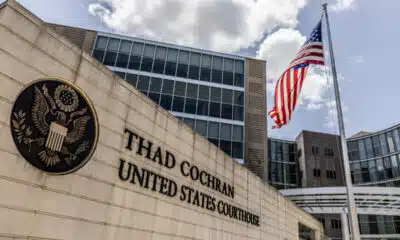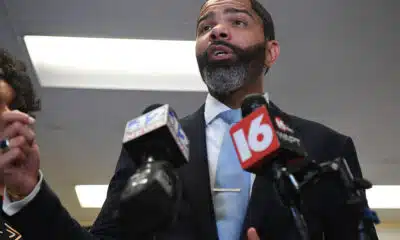Mississippi Today
Mississippi lawmaker cited trans teen surgeries that never actually happened
Mississippi lawmaker cited trans teen surgeries that never actually happened
Sen. Joey Fillingane, defending a controversial bill that would ban gender-affirming care for trans minors, said on the Senate floor Tuesday he’d recently spoken with a Hattiesburg-based plastic surgeon who told him he’d performed gender-confirmation surgery on 17-year-old trans kids.
That plastic surgeon, contacted Wednesday by Mississippi Today, says he didn’t tell Fillingane that and wants the senator to recant his statement.
Though lawmakers this session have fast-tracked House Bill 1125 – which would ban gender-affirming care including hormone therapy, puberty blockers and gender-confirmation surgery for minors – they had been unable to identify any in-state surgeons that have operated on trans youth.
That is, until this past Tuesday, when Fillingane presented the bill to the Senate. He took many by surprise when he said he’d talked to “plastic surgeons in Hattiesburg” who told him they had “on occasion” performed gender-confirmation surgeries on 17-year-olds with parental consent.
“I don’t think it’s often,” Fillingane, R-Sumrall, said on the Senate floor. “I don’t want to make it sound like it’s rampant or it happens a lot, but with one plastic surgeon friend of mine that I’ve spoken with in Hattiesburg just this weekend, he confirmed that, ‘Yeah, I can’t give you specifics, but yeah, I’ve done this.’”
Paul Talbot, who founded the Plastic Surgery Center of Hattiesburg in 1998, told Mississippi Today he is the surgeon Fillingane talked to. He recalled the recent conversation with Fillingane — which took place after the men ran into each other at Revolution Fitness in Hattiesburg — differently.
“It was a two-minute conversation,” Talbot said. “I was on one elliptical, he was on the other.”
While they were exercising, Talbot said he told Fillingane he has taken on trans adults as clients but has never performed surgery on trans kids.
“I’ve never done anybody (trans) under the age of 18,” Talbot told Mississippi Today. “He must’ve misheard that because no, we’ve never done that. Never had someone ask me under 18 to do it.”
Talbot said he may have told Fillingane he might consider performing surgery on a trans teenager under certain circumstances, but he probably would not do it. (International organizations that set standards for gender-affirming care say surgery is appropriate for trans youth in some cases.)
“If I’m gonna do it for you, one is you gotta be 18,” he said. “Two, I need a letter from your psychiatrist that says you’re stable enough and you know what you’re doing before I’ll even consider it.”
It wasn’t a big deal to talk to Fillingane about HB 1125, Talbot said, because the two have been friends for more than 10 years, and it seemed like the senator was curious about his experience as a surgeon.
He doesn’t want Fillingane to feel called out but said that it is a shame this misunderstanding is now “part of the record” of the bill.
“For the political climate in Mississippi, it’s probably a good thing for him,” Talbot said. “But for trans people, it’s probably a bad thing for them.”
Speaking to Mississippi Today in his office Thursday, Fillingane wouldn’t say that he spoke with Talbot over the weekend, but he said he only spoke to one plastic surgeon who he knows “from the gym.”
“I’m not gonna confirm or deny the person, but I heard what I heard, obviously,” Fillingane said. “I was speaking on that bill, so to whomever I was speaking with, I don’t know how one could mishear something. You’re talking about a specific bill that deals with this specific issue of surgeries related to folks who are trying to transition from one sex to the other.”
Fillingane added that he’s had “a bunch” of other conversations about HB 1125, including one with the Mississippi State Medical Association’s government relations staffer, who said the organization has no position on the bill.
“One conversation, whether it was misheard or not, certainly does not comprise the entirety of my due diligence on this bill,” Fillingane said.
After Mississippi Today spoke with Fillingane, he sent Talbot a text apologizing “for any unwanted attention you may have received from the HB 1125 coverage.”
“I wanted you to know that I never told them press your name but it seems they have figured it out because I was ambushed by a reporter from MS Today earlier today because I had said I had spoken with a plastic surgeon friend of mine from Hattiesburg about the bill,” he wrote. “They apparently pieced it together but I would never confirm nor deny who it was that I had spoken with but I apologize anyway.”
It’s likely that HB 1125, which passed the Senate on Tuesday along party lines, would have been headed to the governor’s desk whether or not Fillingane had claimed to find a surgeon in Mississippi who has performed gender-confirmation surgery on trans minors.
Regardless of the outcome of his conversation at the gym, Fillingane said he would have supported the bill.
“Even if you were to accept for the sake of argument that these particular surgeries don’t happen at all or certainly very often in this state, so therefore we don’t need this bill, I think (that) misses the larger point,” he said. “There are other parts of this bill, i.e. the prescription of puberty blocking drugs and the prescribing of cross hormone therapies, that I think we all can admit is in fact happening in Mississippi.”
Other powerful elected officials, like Gov. Tate Reeves, have claimed with no proof that gender-confirmation surgery is harming Mississippi children.
“While some in our country push surgical mutilation onto 11 year olds, even here in Mississippi, even liberal darlings like Finland and Denmark and Sweden don’t allow these surgeries to be performed on kids who are under the age of 18,” Reeves said in his State of the State address.
Similar claims misrepresent just how difficult it is for trans kids in Mississippi to access gender-affirming care, advocates and in-state providers say.
There is just one clinic in the state — Spectrum: The Other Clinic in Hattiesburg — that currently prescribes puberty blockers and hormones to teenagers 16 years or older. Younger trans kids and their families must go out of state to access these medications, which often aren’t covered by insurance and can be costly, sometimes tens of thousands of dollars a year.
Rob Hill, the state director of the Human Rights Campaign Mississippi, said he is angry that Fillingane, Reeves and other lawmakers have spread misinformation this session about gender-affirming care because it endangers already vulnerable trans kids. Gender-affirming care is evidence-based and multiple studies have shown it significantly reduces suicidality among trans kids who receive it.
Fillingane is “somebody that touts his faith very often, and I would say that this is not a faithful act,” Hill said. “What the lieutenant governor did, what the speaker did and what the governor’s ultimately going to do — and those who voted for this legislation — is not faithful … it was harmful.”
The misinformation and lack of research by lawmakers is typical for bills that take on “culture war” issues in Mississippi. In 2021, lawmakers could not identify any complaints about trans athletes in Mississippi despite banning their participation on sports teams that align with their gender identity. Last year, many lawmakers were repeatedly asked to correctly define “critical race theory” and could not.
But this session, Fillingane sought to do what no other Republican lawmaker had done so far in the debate around HB 1125: Talk to actual providers of gender-affirming care in Mississippi. On Monday, he invited Stacie and Lee Pace, the owners of Spectrum: The Other Clinic, to meet with him in his office about the care they provide.
At the gym, Talbot recalled a more casual conversation.
“This was no big formal thing where you’re taking notes or anything like that,” he said, noting that Fillingane’s questions were about what he does and how many trans people he’s operated “as far as, is it a big number.”
Talbot estimated he has performed chest surgery on five trans adults roughly the ages of 24 or 25 who had psychiatric letters, which is what he says he told Fillingane.
In general, Talbot said he doesn’t operate on people under 18 because that’s what he believes is moral. He said most surgeons in Mississippi do the same.
“I wouldn’t bend that rule just because we’re doing a gender transition,” he said.
There’s only a few instances in which Talbot would, like a congential condition that results in substantially uneven breasts. Talbot also gave this example: “She’s gonna be 18 in a month or two, and so you’re going to college, where, you know, before you go to college, every body knows your body image before you get there. Mom’s on board, and it seems like a reasonable thing. Yes, yeah, I’ve done that. But again, that’s rare.”
The gender binary is not as clear-cut as some Mississippians might think, Talbot said. He thinks of cosmetic procedures for cis people as on the same spectrum as those for trans people.
“Typically once you have them draped out in the operating room ready to do surgery, I couldn’t tell if it’s a boy or girl lying on the table,” he said.
There’s no difference, he said, when it comes to the actual procedure: A mastectomy for a cis woman is performed exactly the same way as “top surgery” on a trans man. Still, in Mississippi and across the country, trans people face more barriers in obtaining the same procedures that cis people can get with little questions asked.
“I don’t put a big weight on transitioning,” Talbot said. “I mean, we screen them, I think, better. … We probably find out a lot more information. When it comes down to doing the surgery, it’s just another operation I’ve done 15,000 times, and this one’s no different from the last 15,000.”
All Mississippians should be able to get plastic surgery if they can pay for it, Talbot said. That’s why he doesn’t take insurance.
“There’s lots of girls, thank goodness, walking around with small breasts that want big breasts,” he said. “You don’t get them just because you’ve got small breasts. It’s the same thing to me.”
As the two were exercising, Talbot said he told Fillingane that he doesn’t think House Bill 1125 is a good idea.
“I don’t like them reducing what people can do or limiting what people can do – for anybody, for any group,” Talbot said. “It doesn’t seem right.”
The next time he sees Fillingane at the gym, Talbot said he’ll ask him to take back his comments.
“When I see Joey, I’ll have to say to him, ‘Hey, you need to recant that or whatever because no I’ve never done that,’” Talbot said. “Again, he was on the (elliptical), I was on the (elliptical). It could easily have been misunderstood, I would think.”
This article first appeared on Mississippi Today and is republished here under a Creative Commons license.
Mississippi Today
Trump nominates Baxter Kruger, Scott Leary for Mississippi U.S. attorney posts
President Donald Trump on Tuesday nominated Baxter Kruger to become Mississippi’s new U.S. attorney in the Southern District and Scott Leary to become U.S. attorney for the Northern District.
The two nominations will head to the U.S. Senate for consideration. If confirmed, the two will oversee federal criminal prosecutions and investigations in the state.
Kruger graduated from the Mississippi College School of Law in 2015 and was previously an assistant U.S. attorney for the Southern District. He is currently the director of the Mississippi Office of Homeland Security.
Sean Tindell, the Mississippi Department of Public Safety commissioner, oversees the state’s Homeland Security Office. He congratulated Kruger on social media and praised his leadership at the agency.
“Thank you for your outstanding leadership at the Mississippi Office of Homeland Security and for your dedicated service to our state,” Tindell wrote. “Your hard work and commitment have not gone unnoticed and this nomination is a testament to that!”
Leary graduated from the University of Mississippi School of Law, and he has been a federal prosecutor for most of his career.
He worked for the U.S. Attorney’s Office in the Western District of Tennessee in Memphis from 2002 to 2008. Afterward, he worked at the U.S. Attorney’s Office for the Northern District of Mississippi in Oxford, where he is currently employed.
Leary told Mississippi Today that he is honored to be nominated for the position, and he looks forward to the Senate confirmation process.
This article first appeared on Mississippi Today and is republished here under a Creative Commons Attribution-NoDerivatives 4.0 International License.
The post Trump nominates Baxter Kruger, Scott Leary for Mississippi U.S. attorney posts appeared first on mississippitoday.org
Note: The following A.I. based commentary is not part of the original article, reproduced above, but is offered in the hopes that it will promote greater media literacy and critical thinking, by making any potential bias more visible to the reader –Staff Editor.
Political Bias Rating: Centrist
This article presents a straightforward news report on President Donald Trump’s nominations of Baxter Kruger and Scott Leary for U.S. attorney positions in Mississippi. It focuses on factual details about their backgrounds, qualifications, and official responses without employing loaded language or framing that favors a particular ideological perspective. The tone is neutral, with quotes and descriptions that serve to inform rather than persuade. While it reports on a political appointment by a Republican president, the coverage remains balanced and refrains from editorializing, thus adhering to neutral, factual reporting.
Mississippi Today
Jackson’s performing arts venue Thalia Mara Hall is now open
After more than 10 months closed due to mold, asbestos and issues with the air conditioning system, Thalia Mara Hall has officially reopened.
Outgoing Mayor Chokwe A. Lumumba announced the reopening of Thalia Mara Hall during his final press conference held Monday on the arts venue’s steps.
“Today marks what we view as a full circle moment, rejoicing in the iconic space where community has come together for decades in the city of Jackson,” Lumumba said. “Thalia Mara has always been more than a venue. It has been a gathering place for people in the city of Jackson. From its first class ballet performances to gospel concerts, Thalia Mara Hall has been the backdrop for our city’s rich cultural history.”
Thalia Mara Hall closed last August after mold was found in parts of the building. The issues compounded from there, with malfunctioning HVAC systems and asbestos remediation. On June 6, the Mississippi State Fire Marshal’s Office announced that Thalia Mara Hall had finally passed inspection.
“We’re not only excited to have overcome many of the challenges that led to it being shuttered for a period of time,” Lumumba said. “We are hopeful for the future of this auditorium, that it may be able to provide a more up-to-date experience for residents, inviting shows that people are able to see across the world, bringing them here to Jackson. So this is an investment in the future.”
In total, Emad Al-Turk, a city contracted engineer and owner of Al-Turk Planning, estimates that $5 million in city and state funds went into bringing Thalia Mara Hall up to code.
The venue still has work to be completed, including reinstalling the fire curtain. The beam in which the fire curtain will be anchored has asbestos in it, so it will have to be remediated. In addition, a second air-conditioning chiller needs to be installed to properly cool the building. Until it’s installed, which could take months, Thalia Mara Hall will be operating at a lower seating capacity of about 800.
“Primarily because of the heat,” Al-Turk said. “The air conditioning would not be sufficient to actually accommodate the 2,000 people at full capacity, but starting in the fall, that should not be a problem.”
Al-Turk said the calendar is open for the city to begin booking events, though none have been scheduled for July.
“We’re very proud,” he said. “This took a little bit longer than what we anticipated, but we had probably seven or eight different contractors we had to coordinate with and all of them did a superb job to get us where we are today.”
This article first appeared on Mississippi Today and is republished here under a Creative Commons Attribution-NoDerivatives 4.0 International License.
The post Jackson’s performing arts venue Thalia Mara Hall is now open appeared first on mississippitoday.org
Note: The following A.I. based commentary is not part of the original article, reproduced above, but is offered in the hopes that it will promote greater media literacy and critical thinking, by making any potential bias more visible to the reader –Staff Editor.
Political Bias Rating: Centrist
The article presents a straightforward report on the reopening of Thalia Mara Hall in Jackson, focusing on facts and statements from city officials without promoting any ideological viewpoint. The tone is neutral and positive, emphasizing the community and cultural significance of the venue while detailing the challenges overcome during renovations. The coverage centers on public investment and future prospects, without partisan framing or editorializing. While quotes from Mayor Lumumba and a city engineer highlight optimism and civic pride, the article maintains balanced, factual reporting rather than advancing a political agenda.
Mississippi Today
‘Hurdles waiting in the shadows’: Lumumba reflects on challenges and triumphs on final day as Jackson mayor
On his last day as mayor of Jackson, Chokwe Antar Lumumba recounted accomplishments, praised his executive team and said he has no plans to seek office again.
He spoke during a press conference outside of the city’s Thalia Mara Hall, which was recently cleared for reopening after nearly a year of remediation. The briefing, meant to give media members a peek inside the downtown theater, marked one of Lumumba’s final forays as mayor.
Longtime state Sen. John Horhn — who defeated Lumumba in the Democratic primary runoff — will be inaugurated as mayor Tuesday, but Lumumba won’t be present. Not for any contentious reason, the 42-year-old mayor noted, but because he returns to his private law practice Tuesday.
“I’ve got to work now, y’all,” Lumumba said. “I’ve got a job.”
Thalia Mara Hall’s presumptive comeback was a fitting end for Lumumba, who pledged to make Jackson the most radical city in America but instead spent much of his eight years in office parrying one emergency after another. The auditorium was built in 1968 and closed nearly 11 months ago after workers found mold caused by a faulty HVAC system – on top of broken elevators, fire safety concerns and vandalism.
“This job is a fast-pitched sport,” Lumumba said. “There’s an abundance of challenges that have to be addressed, and it seems like the moment that you’ve gotten over one hurdle, there’s another one that is waiting in the shadows.”
Outside the theater Monday, Lumumba reflected on the high points of his leadership instead of the many crises — some seemingly self-inflicted — he faced as mayor.
He presided over the city during the coronavirus pandemic and the rise in crime it brought, but also the one-two punch of the 2021 and 2022 water crises, exacerbated by the city’s mismanagement of its water plants, and the 18-day pause in trash pickup spurred by Lumumba’s contentious negotiations with the city council in 2023.
Then in 2024, Lumumba was indicted alongside other city and county officials in a sweeping federal corruption probe targeting the proposed development of a hotel across from the city’s convention center, a project that has remained stalled in a 20-year saga of failed bids and political consternation.
Slated for trial next year, Lumumba has repeatedly maintained his innocence.
The city’s youngest mayor also brought some victories to Jackson, particularly in his first year in office. In 2017, he ended a furlough of city employees and worked with then-Gov. Phil Bryant to avoid a state takeover of Jackson Public Schools. In 2019, the city successfully sued German engineering firm Siemens and its local contractors for $89 million over botched work installing the city’s water-sewer billing infrastructure.
“I think that that was a pivotal moment to say that this city is going to hold people responsible for the work that they do,” Lumumba said.
Lumumba had more time than any other mayor to usher in the 1% sales tax, which residents approved in 2014 to fund infrastructure improvements.
“We paved 144 streets,” he said. “There are residents that still are waiting on their roads to be repaved. And you don’t really feel it until it’s your street that gets repaved, but that is a significant undertaking.”
And under his administration, crime has fallen dramatically recently, with homicides cut by a third and shootings cut in half in the last year.
Lumumba was first elected in 2017 after defeating Tony Yarber, a business-friendly mayor who faced his own scandals as mayor. A criminal justice attorney, Lumumba said he never planned to seek office until the stunning death of his father, Chokwe Lumumba Sr., eight months into his first term as mayor in 2014.
“I can say without reservation, and unequivocally, we remember where we started. We are in a much better position than we started,” Lumumba said.
Lumumba said he has sat down with Horhn in recent months, answered questions “as extensively as I could,” and promised to remain reachable to the new mayor.
This article first appeared on Mississippi Today and is republished here under a Creative Commons Attribution-NoDerivatives 4.0 International License.
The post 'Hurdles waiting in the shadows': Lumumba reflects on challenges and triumphs on final day as Jackson mayor appeared first on mississippitoday.org
Note: The following A.I. based commentary is not part of the original article, reproduced above, but is offered in the hopes that it will promote greater media literacy and critical thinking, by making any potential bias more visible to the reader –Staff Editor.
Political Bias Rating: Center-Left
The article reports on outgoing Jackson Mayor Chokwe Antar Lumumba’s reflections without overt editorializing but subtly frames his tenure within progressive contexts, emphasizing his self-described goal to make Jackson “the most radical city in America.” The piece highlights his accomplishments alongside challenges, including public crises and a federal indictment, maintaining a factual tone yet noting contentious moments like labor disputes and governance issues. While it avoids partisan rhetoric, the focus on social justice efforts, infrastructure investment, and crime reduction, as well as positive framing of Lumumba’s achievements, aligns with a center-left perspective that values progressive governance and accountability.
-
Mississippi Today5 days ago
Defendant in auditor’s ‘second largest’ embezzlement case in history goes free
-
News from the South - Missouri News Feed7 days ago
Residents provide feedback in Kearney Street Corridor redevelopment meeting
-
Our Mississippi Home6 days ago
From ‘I’m Bored’ to ‘Let’s Explore’: A Summer Scavenger Hunt Through Mississippi History
-
News from the South - Louisiana News Feed7 days ago
Louisiana’s energy efficiency ‘slush fund’: $80 million, few rules
-
News from the South - Georgia News Feed4 days ago
Are you addicted to ‘fridge cigarettes’? Here’s what the Gen Z term means
-
News from the South - Texas News Feed7 days ago
The Rio Grande Valley as Heart of LGBTQ+ Resistance and Joy
-
News from the South - Florida News Feed6 days ago
Marcos Lopez arrest: Owner of club named in RICO document
-
News from the South - Tennessee News Feed6 days ago
Mid-South mayor arrested, accused of tax evasion, police say



















































